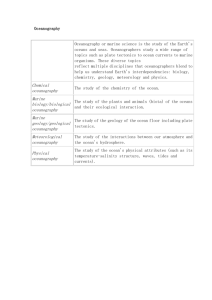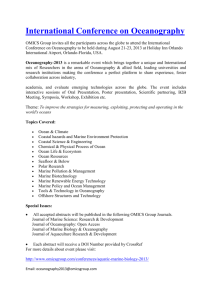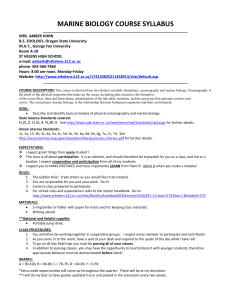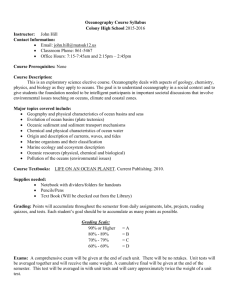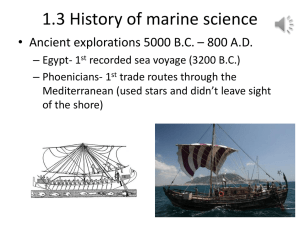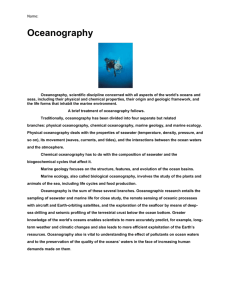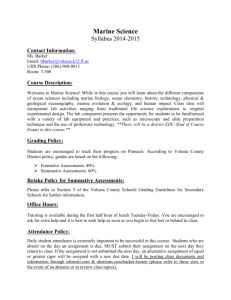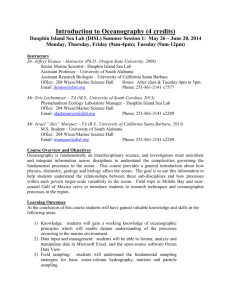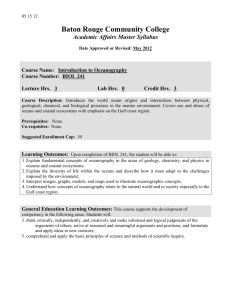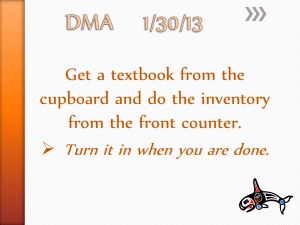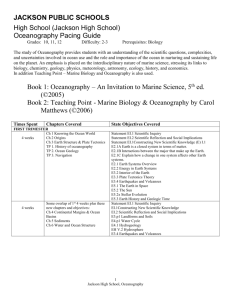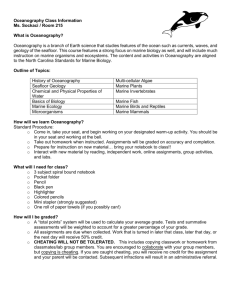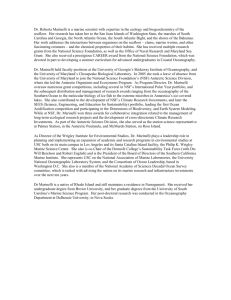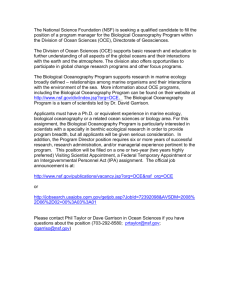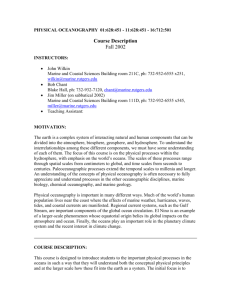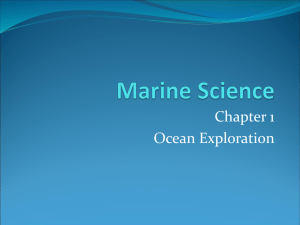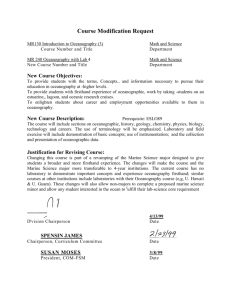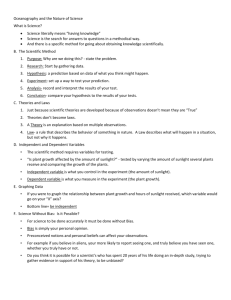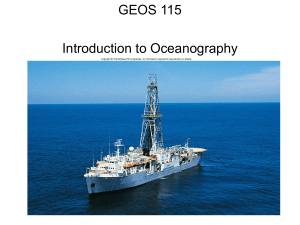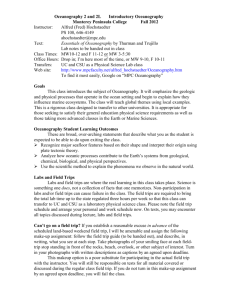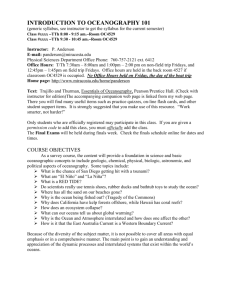Oceanography Summer Assignment
advertisement
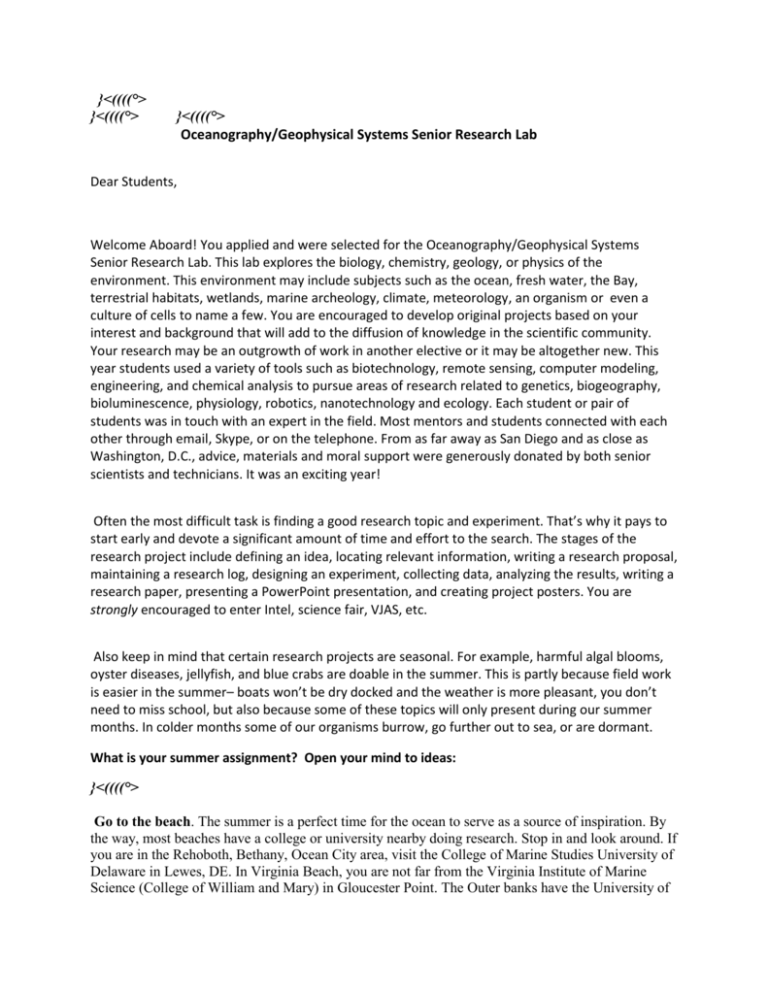
}<((((°> }<((((°> }<((((°> Oceanography/Geophysical Systems Senior Research Lab Dear Students, Welcome Aboard! You applied and were selected for the Oceanography/Geophysical Systems Senior Research Lab. This lab explores the biology, chemistry, geology, or physics of the environment. This environment may include subjects such as the ocean, fresh water, the Bay, terrestrial habitats, wetlands, marine archeology, climate, meteorology, an organism or even a culture of cells to name a few. You are encouraged to develop original projects based on your interest and background that will add to the diffusion of knowledge in the scientific community. Your research may be an outgrowth of work in another elective or it may be altogether new. This year students used a variety of tools such as biotechnology, remote sensing, computer modeling, engineering, and chemical analysis to pursue areas of research related to genetics, biogeography, bioluminescence, physiology, robotics, nanotechnology and ecology. Each student or pair of students was in touch with an expert in the field. Most mentors and students connected with each other through email, Skype, or on the telephone. From as far away as San Diego and as close as Washington, D.C., advice, materials and moral support were generously donated by both senior scientists and technicians. It was an exciting year! Often the most difficult task is finding a good research topic and experiment. That’s why it pays to start early and devote a significant amount of time and effort to the search. The stages of the research project include defining an idea, locating relevant information, writing a research proposal, maintaining a research log, designing an experiment, collecting data, analyzing the results, writing a research paper, presenting a PowerPoint presentation, and creating project posters. You are strongly encouraged to enter Intel, science fair, VJAS, etc. Also keep in mind that certain research projects are seasonal. For example, harmful algal blooms, oyster diseases, jellyfish, and blue crabs are doable in the summer. This is partly because field work is easier in the summer– boats won’t be dry docked and the weather is more pleasant, you don’t need to miss school, but also because some of these topics will only present during our summer months. In colder months some of our organisms burrow, go further out to sea, or are dormant. What is your summer assignment? Open your mind to ideas: }<((((°> Go to the beach. The summer is a perfect time for the ocean to serve as a source of inspiration. By the way, most beaches have a college or university nearby doing research. Stop in and look around. If you are in the Rehoboth, Bethany, Ocean City area, visit the College of Marine Studies University of Delaware in Lewes, DE. In Virginia Beach, you are not far from the Virginia Institute of Marine Science (College of William and Mary) in Gloucester Point. The Outer banks have the University of North Carolina in Wilmington. Graduate students love to talk about what they are doing. You may even find a project you could work on. If you are interested in going out with the Smithsonian and working in one of their labs during the summer let me know. There are several different labs at the Smithsonian’s Environmental Research Center in Edgewater Maryland (near Annapolis). They primarily focus on issues related to the Chesapeake Bay. It is possible for you to collect data during the summer and then continue in the fall with analysis. If you are unable to get to the beach take a virtual trip by visiting websites. Some even include field expeditions in progress. }<((((°> • Visit the following Oceanography websites. These are some of the best places to get ideas for “hot topics”. Woods Hole Oceanographic Institution (WHOI) The Scripps Institute of Oceanography Virginia Institute of Marine Science (VIMS) Smithsonian’s Environmental Research Center (SERC) National Oceanic and Atmospheric Administration (NOAA) Smithsonian’s Ocean Portal • Visit the Sant Ocean Hall at the Smithsonian’s Museum of Natural History in DC • Explore sites specializing in oceanography databases such as RU COOL http://rucool.marine.rutgers.edu/ Visit daily or as often as possible the E/V Nautilus Live expedition that is ongoing in the Gulf of Mexico now. This is the expedition with Dr. Robert Ballard our keynote speaker for TJSTAR in 2014. It is live 24/7 but you’ll want to check at different times to see the ROVs exploring the deep sea. You can write in questions to the scientists and they will answer you live on air. It is really addictive. You can mention TJ in your emails and that I was on board the expedition in October 2013 as was 2014 Grad Katie Valery. Our own rising senior Emily Sun will be part of the crew during July in the eastern Pacific as will Julia Arthur (2012). Don’t be shy. This helps to get your interests out there and find out what others are doing. http://www.nautiluslive.org/ }<((((°> As you visit sites, complete the following: • Select a topic or define areas (no more than three) of interest to you (be as specific as possible). Consider your passion, classroom resources, and the fact that you will investigate this topic for one year. }<((((°> • Find at least 5 resources on each topic. These may include research articles, internet sources, or books. At least one of these resources must be a primary source (from a scientific journal, by the scientist). Read and review the resources and take notes on the information. }<((((°> • READ a book from the summer list. You never know where your next idea will come from. If you are sure about your topic, try to find a book on the specific subject. }<((((°> • Keep a written log of your notes on articles, websites, books, possible contacts, and your thoughts and questions as you progress through this process. }<((((°> Create a couple of slides with pictures of you in action this summer. I prefer that these be showing your “scientific summer” but I am open to any that you would like to share. }<((((°> • Write a Project Brief (see attachment) Have the brief ready to discuss during the first week of class. }<((((°> • Keep in touch with me during the summer. I will be in the field in July. I would like at least one email from each student. Just let me know how things are going. You can contact me with the following address: llwu@fcps.edu
